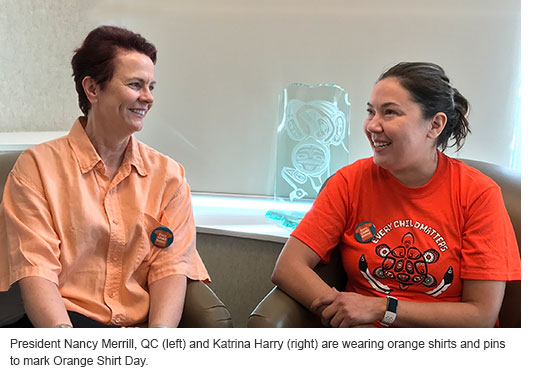Orange Shirt Day is part of a movement that calls on each of us to remember and reflect upon the legacy of residential schools. The first Orange Shirt Day in 2013 was inspired by Phyllis Webstad’s experience as a child. As a six year old, she was excited to wear a new outfit for her first day of school. Her grandmother had purchased a shiny new orange shirt for the occasion. When she arrived at the residential school, the orange shirt — her pride and joy — was taken away from her. It left a lasting hurt.
Orange Shirt Day is a reminder that every child matters. There are too many children who experienced a stark end to their innocence in ways that shaped their lives as adults. Sharing their accounts is part of an effort to address our past and ensure that no child faces the same experience again.
That same effort to protect children and families can be seen in the life and work of Katrina Harry. Katrina is Manager of Indigenous Services at Legal Services Society and of the Parents Legal Centre, a recent initiative to keep children from being removed from their families through early intervention. We know that Indigenous families are overrepresented in the child welfare system – an intergenerational impact of residential schools and something that the Parents Legal Centre and Katrina are striving to change.
 Katrina graduated from the UBC Faculty of Law in 2004 and was called to the bar in 2006. After three years in general practice and the birth of her third child, she was approached by the Legal Services Society to take on child protection cases. Initially unsure that this work was for her, as soon as she met her first client she knew that it was. She explains that it was because she understood family dynamics and related issues, and the people who needed her help were like the community members she grew up with.
Katrina graduated from the UBC Faculty of Law in 2004 and was called to the bar in 2006. After three years in general practice and the birth of her third child, she was approached by the Legal Services Society to take on child protection cases. Initially unsure that this work was for her, as soon as she met her first client she knew that it was. She explains that it was because she understood family dynamics and related issues, and the people who needed her help were like the community members she grew up with.
A year after that initial child protection file, Katrina was asked to head a novel idea — to provide clients with duty counsel services outside of the traditional court setting. She worked with women in the Sheway pregnancy outreach program in the Downtown Eastside and BC Women’s Hospital Fir (Families in Recovery) Square program, which provides maternity care for women struggling with substance misuse. When the Parents Legal Centre launched in February 2015, Katrina was hired as lead counsel. Over the past year, she has helped expand the Parents Legal Centre program across the province. She has worked tirelessly helping families and she has also found time to publish and edit, chair conferences and teach law students and lawyers about child protection law in British Columbia.
Katrina and her team see the intergenerational impact of residential schools every day. Multigenerational homes are common in Indigenous communities and so many families have faced deep trauma due to the legacy of residential schools, historical child protection practices and systemic discrimination — discrimination that was written into law. The intergenerational impact is often recorded in court documents, where we learn that parents were removed from their families and placed in care themselves. Unfortunately, that fact may be held against them when faced with the potential removal of their own children by the state.
Katrina tells her staff that clients’ trust cannot be assumed, but must be earned. She says their clients have faced so much trauma that sometimes their fear makes them defensive, aggressive or disengaged. The justice system can be intimidating for most people who navigate it, and it is even more so with Indigenous people. Katrina and her team hope to help change that. In her own words, she describes what they aspire to:
What we hope to bring to Indigenous clients, just as we would with all clients in our clinics, is that they feel heard and understood throughout this process, that they feel empowered by knowing their rights and responsibilities as parents, and that their cultural connection with their child is maintained, both with their family and with their community.
When we talk about child protection, we are not just talking about the connection between parent and child. Family is so important. It is the grandparent and the child. It is the siblings together. It is the aunts and uncles. It is all of that goodness that goes with family ties that we are affecting when children go into care.
Katrina Harry continues to help vulnerable and disadvantaged people navigate our legal system, and in doing so helps shape a better future for us all. Katrina Harry is another of our unsung heroes.